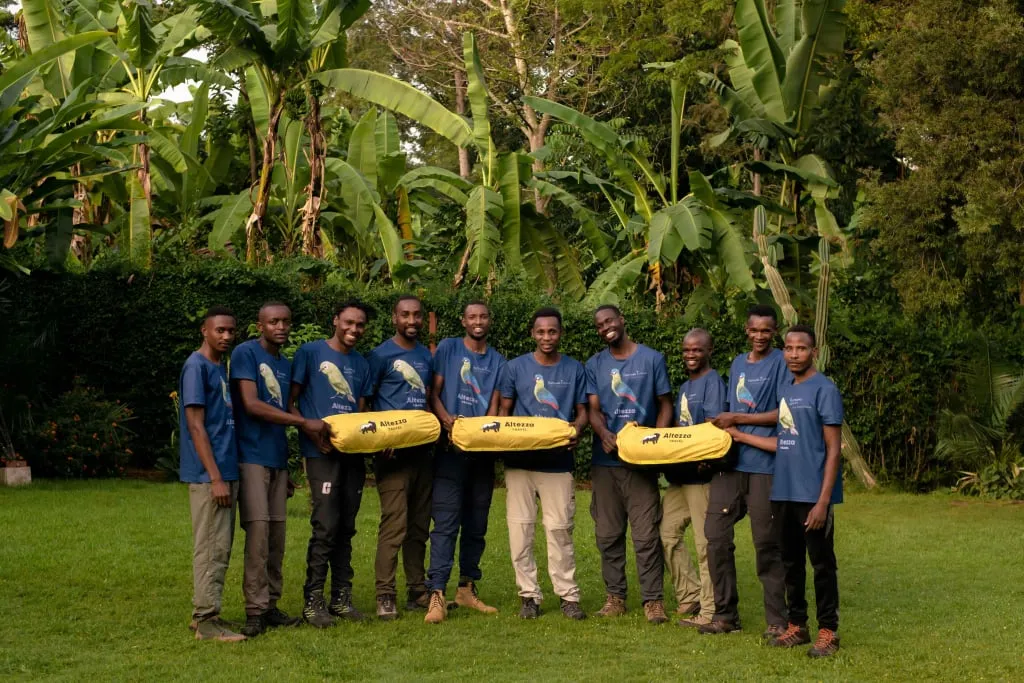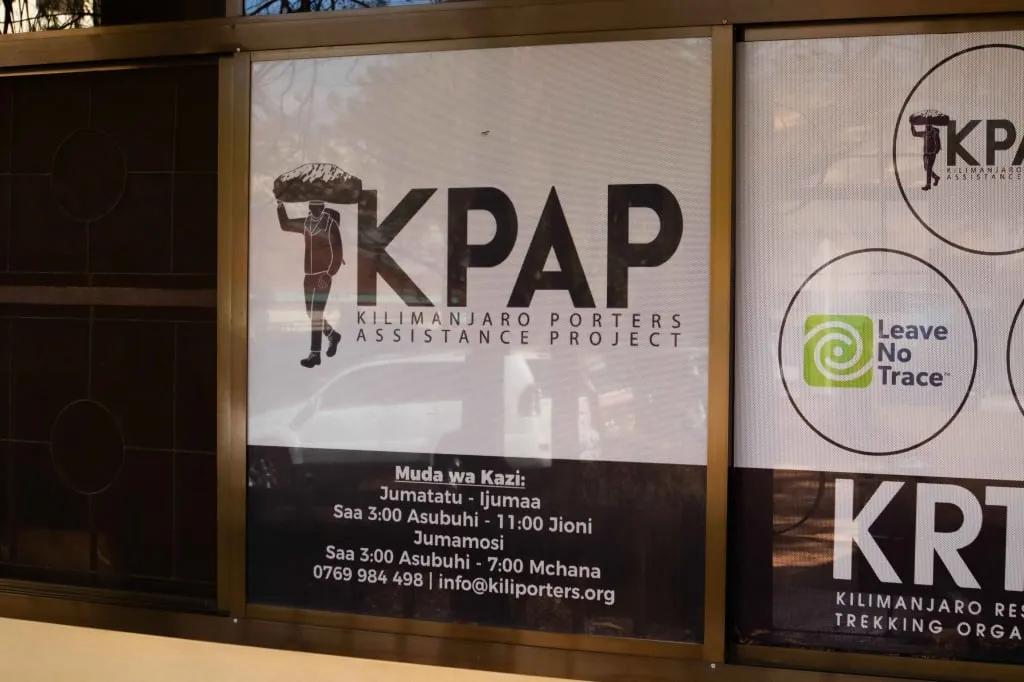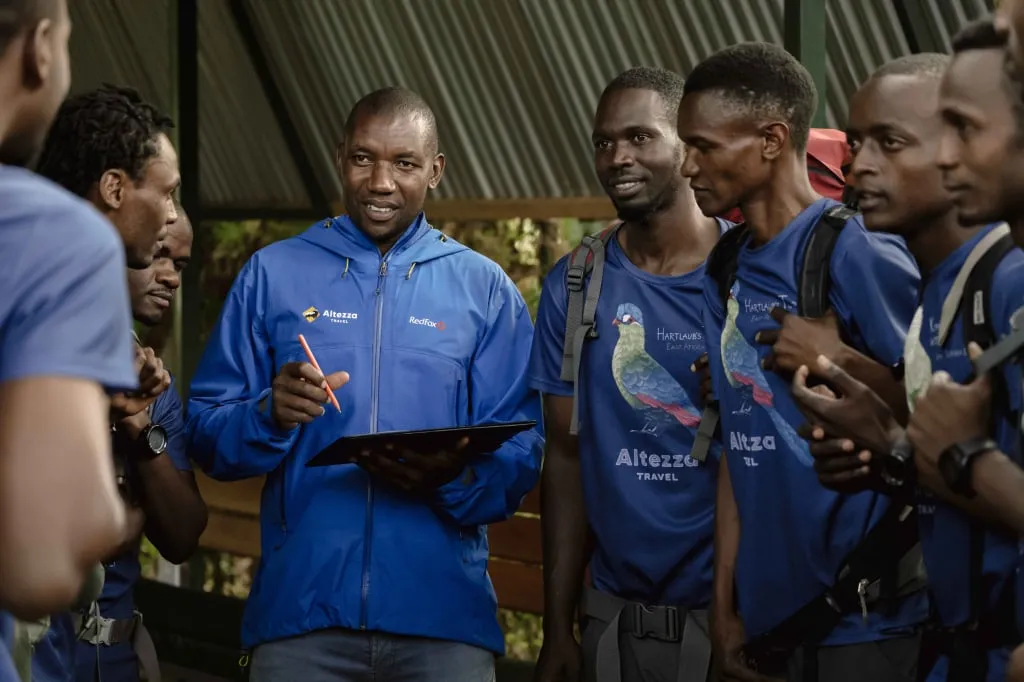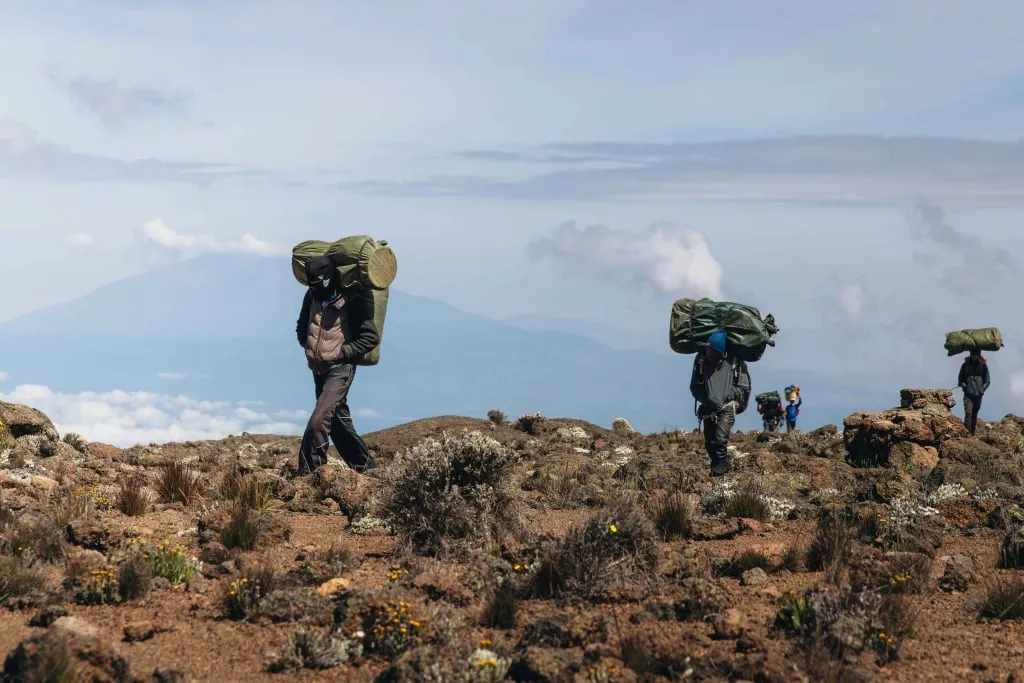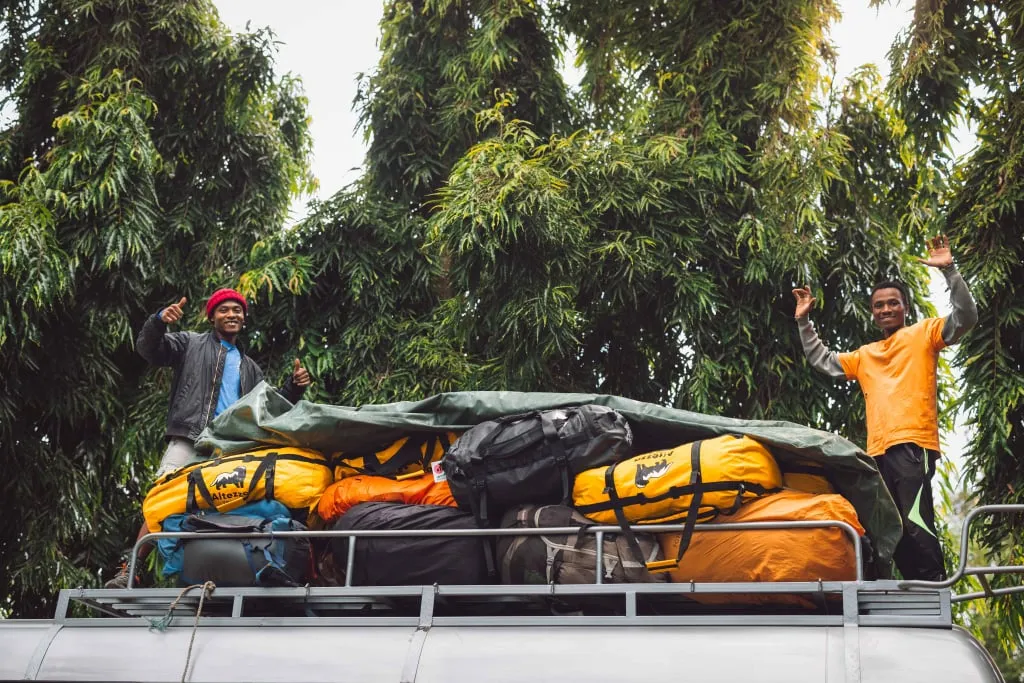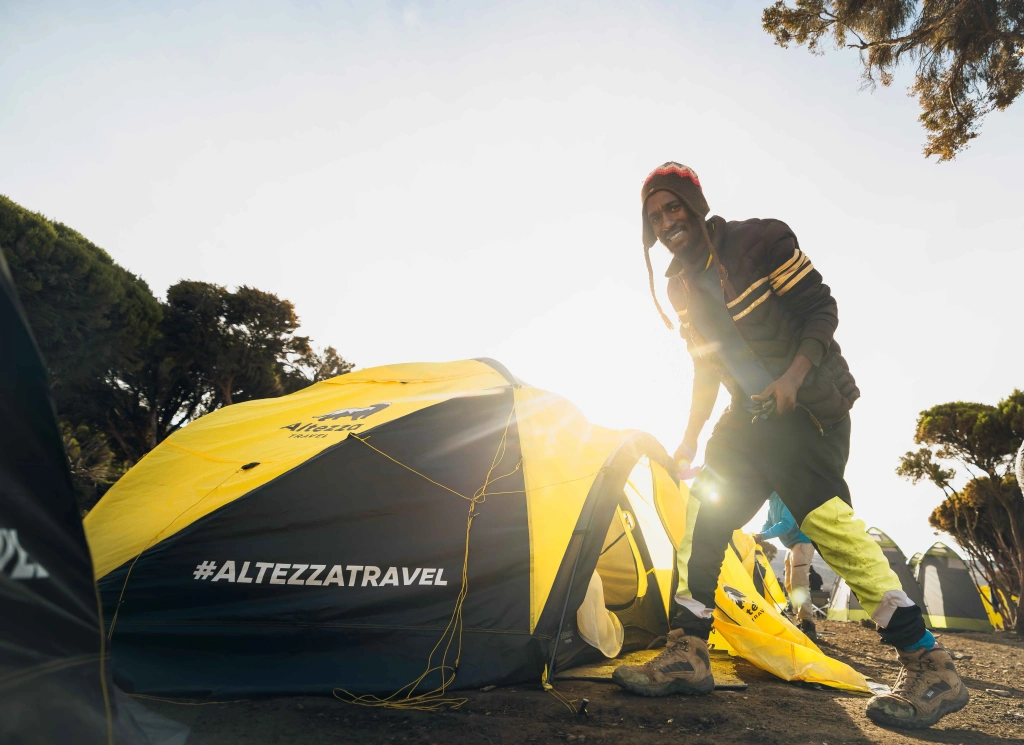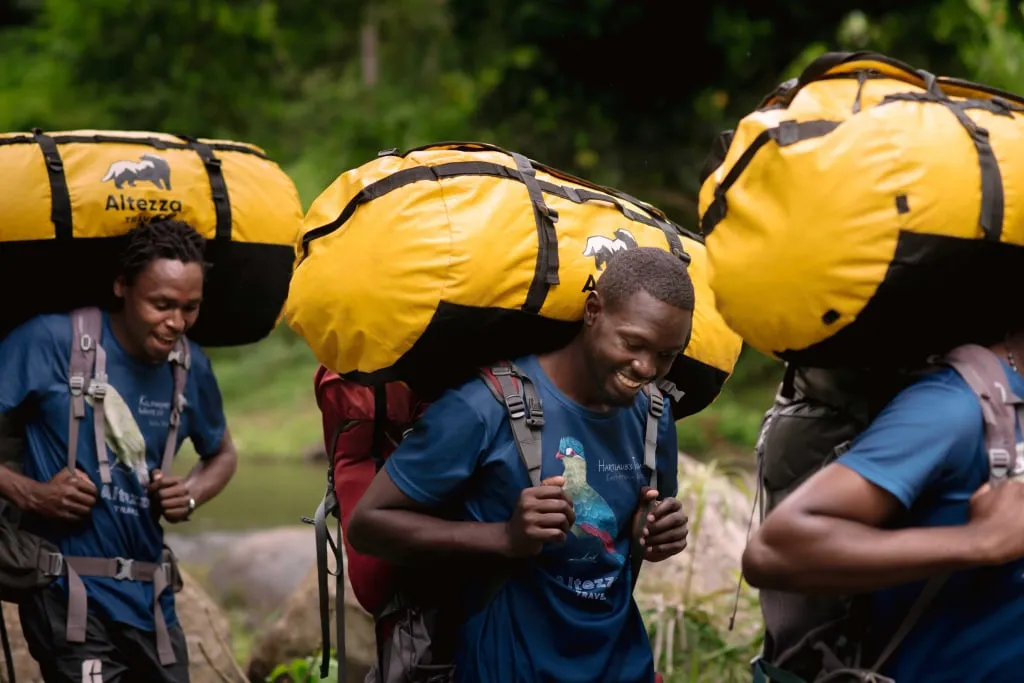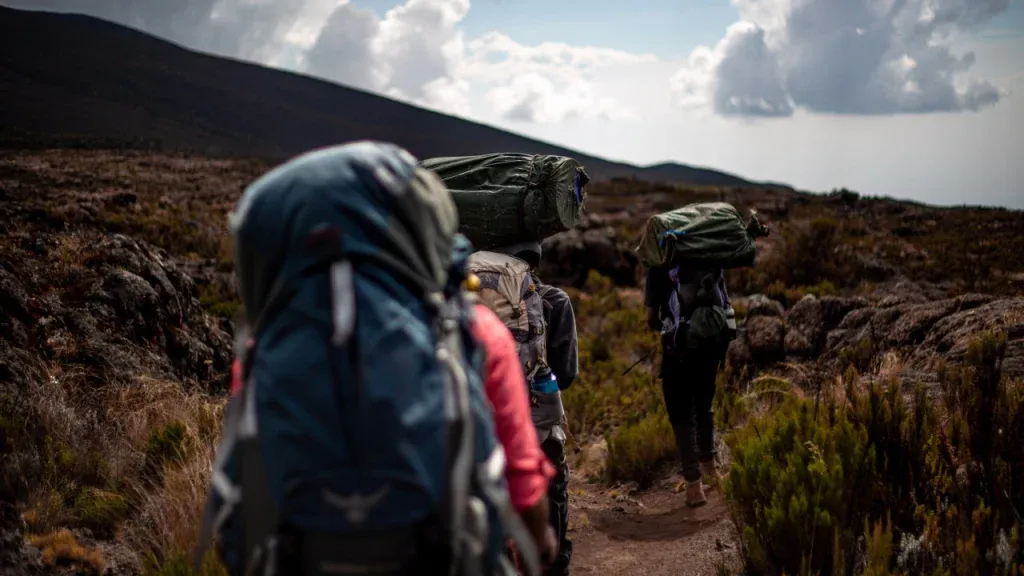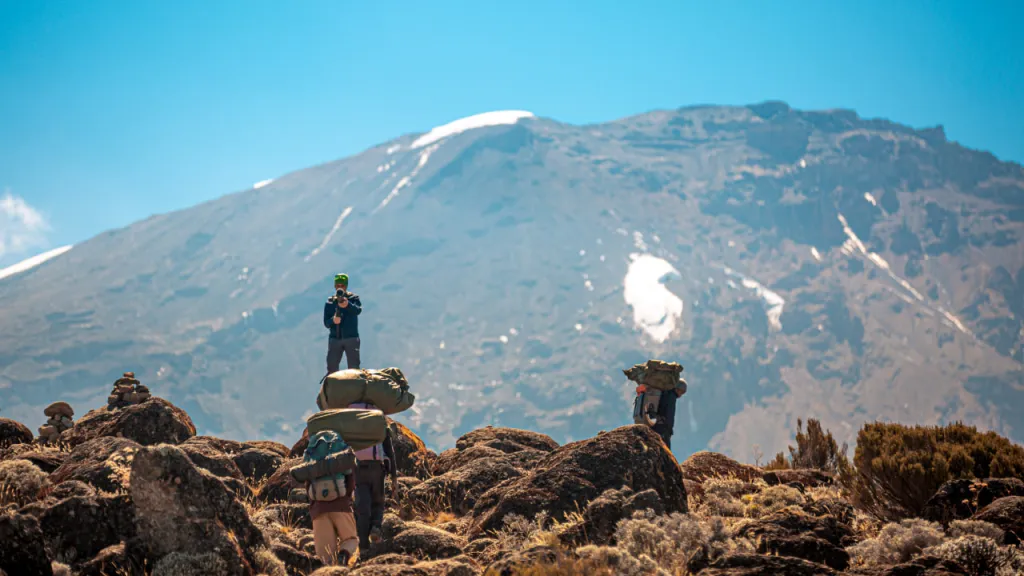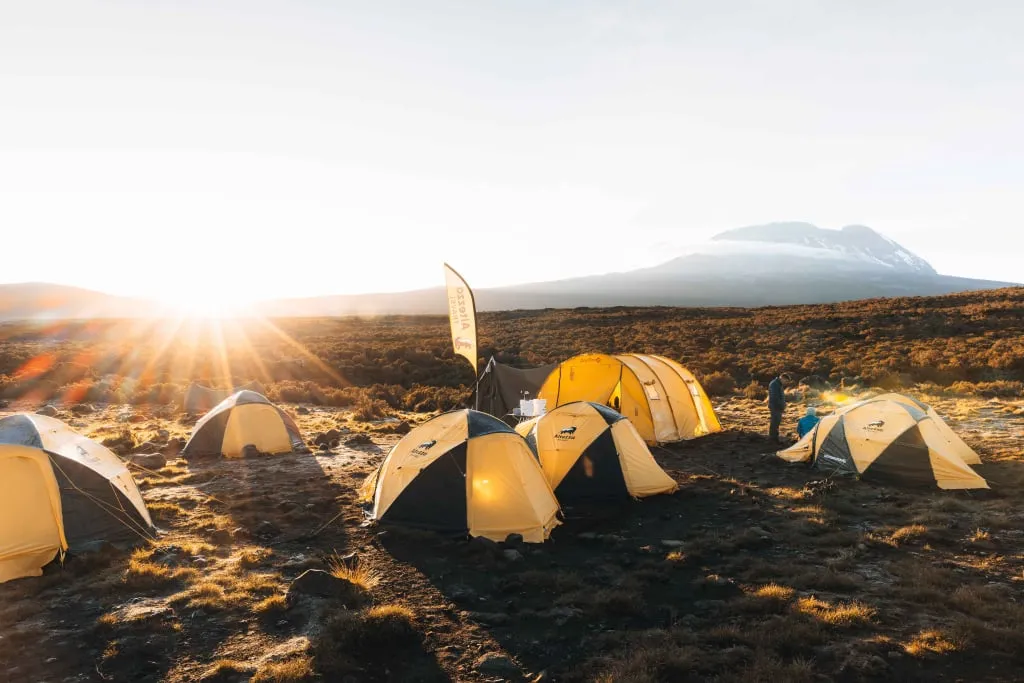When planning a trip to Africa, it's essential to consider socially responsible travel. Choosing a trustworthy and responsible climbing company is key. This choice determines whether you'll be supporting the local community or unintentionally taking part in the unethical treatment of the locals.
Here we'll discuss the life and work of the porters on Kilimanjaro. Continue reading to learn more about an organization dedicated to improving working conditions of Kilimanjaro mountain crew members.
What is KPAP?
Located in Moshi, the largest city in the Kilimanjaro region, is the office of the Kilimanjaro Porters Assistance Project, or KPAP for short. It's an independent nonprofit that advocates for fair and ethical treatment of porters and other members of mountain teams working on the slopes of Kilimanjaro.
KPAP was established in 2003 as a Tanzania-specific responsible travel program. It was set up by another organization called the International Mountain Explorers Connection (IMEC). IMEC itself has been around since 1996 and helps porters in Nepal. It was founded by Scott Dimetrosky, an amateur mountaineer and businessman.
Climbing in the Himalayas, Scott noticed that Nepali porters were doing really hard work for unfairly low pay. The living conditions of porters and their families who depended on them were deplorable. This was especially noticeable in contrast to the well-off tourists coming to conquer the Himalayan peaks. So, he set up a nonprofit aimed at improving the lives of porters and advocating for fair working conditions. International Mountain Explorers Connection was established to foster ethical and sustainable relationships between explorers and the inhabitants of the world's developing alpine regions.
These same goals were extended to helping porters on Kilimanjaro. KPAP's main tasks include raising public awareness about how men and women working as porters in the Kilimanjaro climbing industry live, as well as constantly doing everything possible to improve their working conditions and promote responsible treatment practices.
At Altezza Travel, we're fully committed to the ethical treatment of employees. We share KPAP’s vision and values. We're an accredited partner company of the Kilimanjaro Porters Assistance Project (KPAP). Altezza Travel goes even beyond the basic recommended standards. We do so by introducing new social initiatives in our company. These initiatives positively impact the lives and work of our porters and other mountain crew members. To learn more about how we look out for our porters, check out our page on guides and porters. For info on how we handle tipping after expeditions, read our article on tipping ethics.
Now, let’s talk about the Kilimanjaro Porters Assistance Project. How does it benefit porters and their families? And how you can help the people of Kilimanjaro when you climb up Africa's highest mountain.
What does KPAP do?
The Kilimanjaro Porters Assistance Project is an organization that has several people working in an office in Moshi. KPAP also employs around a hundred in-house porters who act as inspectors and collect data about tour operators. These inspectors take part in every expedition heading to Kilimanjaro. After descending the mountain, the inspector porter fills out a detailed report. It provides a comprehensive look at how the expedition was organized. It's worth mentioning that this report is pretty extensive, covering 7 pages.
Can a tour operator company influence what the independent porter will write in the report? The answer is no. The porter gets paid well and isn't interested in taking bribes. Plus, different porters participate in each hiking expedition as ordinary members of a mountain crew. So if there's an issue, it's bound to come out sooner or later.
Based on the reports filled out over a six-month period, each company is given an internal rating. To become a KPAP partner, a company must have a rating of 85% or higher. If the rating drops below 85%, the company is removed from the partner list. Companies that exploit porters and don't operate ethically are placed on a "blacklist" in the tourism industry. We strongly advise against booking a Kilimanjaro tour with such companies.
So what do the inspector porters' reports actually contain? Here's what KPAP pays close attention to:
- The porter's wage must not be less than the minimum of 20,000 shillings per day;
- Wages should be paid no later than the 2nd day after the expedition ends;
- Three meals a day with adequate servings during the expeditions should be provided to porters free of charge;
- Each porter should receive three meals a day with adequate servings during the expeditions;
- The tents in which porters sleep must be of good quality. With enough sleeping spaces for everyone. There should be an appropriate number of tents for the entire crew.
- The weight carried by a single porter must not exceed 20 kg (44 lbs);
- There should be at least three porters for each climber. (on the Marangu route, at least two);
- The company should ensure transparent and fair distribution of tips among all mountain crew members. (porters, guides, cooks);
- Each porter should have appropriate gear;
- In case of illness or injury, the porter should receive proper first aid, care, and medical assistance.
Meeting all these requirements isn't complicated. But so far, about 70% of Kilimanjaro expeditions don't comply. Owners of non-compliant companies claim they don't want to become KPAP partner companies for made-up reasons. In reality, it's more profitable for them to break the rules and don't pay fair wages. Some even create their own associations, claiming to protect porters' rights and ensure ethical treatment. However, those serve as a smokescreen for irresponsible tour operators.
These are the main standards monitored by KPAP. Additionally, any porter who has been on an expedition with any company can approach the organization. If they're aware of mistreatment or poor conditions set by the employer, they can inform KPAP staff. The staff will then contact the company to investigate and resolve the issue.
Over the last 20 years, a lot of work has been done that has genuinely improved the lives of Kilimanjaro porters. Among the educational opportunities offered by the organization are:
- Porters’ rights awareness sessions for more than 5,000 people;
- English language classes (important for work involving foreigners);
- Seminars on managing personal and family finances, as well as community budget management;
- Lending mountain clothing to porters free of charge;
- Environmental protection courses on Mount Kilimanjaro;
- First aid certification courses.
KPAP also helps with lending mountain clothing and gear. They lend it to porters who can't afford to buy the necessary clothing and footwear for expeditions. From time to time, the organization also provides case-by-case support services. Mountain crew members in need can always reach out to them. Various KPAP courses and educational opportunities are available to help porters gain qualifications.
Becoming a KPAP partner company
If your climbing company operates Kilimanjaro climbs, you can voluntarily partner up with the Kilimanjaro Porters Assistance Project (KPAP). It's free and a respectable thing to do. Companies that care about local work standards and pay fair wages tend to earn a good name for themselves by becoming KPAP partners. A commitment to responsible treatment practices is at the core of our operations at Altezza.
To become a partner company, here's what you've got to do. Apply, go through six months of monitoring, and score at least an 85% rating. After that, you've got to keep up that rating every climbing season. If you follow these rules, your climbing company will be included on the partner companies list.
For example, we are a proud partner of KPAP. You can verify this by visiting the IMEC website's accredited companies list for the current year. Just select "Tanzania" as the country, and you'll find Altezza Travel near the top of the list.
You see, those of us operating on Kilimanjaro don't have any influence over KPAP. Membership fees aren't a thing. Being a part of the partnership program is free for us.
Now, you may wonder how KPAP runs without being a commercial or government initiative. Where does the money for staff salaries, office rent, operational costs, porter training courses, and equipment come from? KPAP relies solely on donations. And at the moment, they're running low on funds.
As for Altezza Travel, we support KPAP by earmarking part of our earnings as donations. 3 dollars from each climber that goes up Kilimanjaro with us. We're also reaching out to you for KPAP support.
How to help the Kilimanjaro Porters Assistance Project?
You can donate directly to KPAP through their websites:
Both links will take you to a PayPal donation page. You have the choice to make a one-time donation or set up a recurring monthly contribution directly from your bank card.
You probably already know that recurring donations are more beneficial for charities. It's easier for organizations to plan their work for the months ahead when they can count on steady, even if modest, income. One-time donations, no matter how generous, don't help with long-term planning. But KPAP is happy to accept help in any form.
You can also donate through us. Either on the Altezza Travel website or in your personal traveler account if you're booking a tour with us. We'll transfer all your funds to KPAP without taking any fees. You'll get a detailed receipt from us. Later you can reach out to KPAP to make sure your donation reached its destination and is being put to good use.
Why does responsible tourism matter?
Why should you get involved? It's all about responsible tourism. When you travel, it's not just about not causing harm to the places you visit and their communities. It's also about supporting common people from less privileged countries. For us, as a tour company, it's vital to partner with an organization that stands up for porter rights.
For us at Altezza, it's about social responsibility, and building trust and reputation in our business, which attracts more and more climbers and supports the local communities. More than that, it aligns with our business values. For you, it's about ethical tourism, showing respect to the Tanzanian locals. And directly impacting the living standards of porters and their families. Typically, in Kilimanjaro, one person working as a porter supports another 5-6 family members.
Think carefully before opting for a very cheap tour to save money. You'll be not just putting yourself at risk and settling for less-than-ideal expedition conditions. Such a choice can also damage the local economy. Budget tour operators typically provide poor working conditions for porters, paying them lower wages. This, in turn, means their families get less food, medicine, and opportunities for a decent life. Be responsible and travel only with companies accredited by KPAP.
Sadly, the government doesn't have the means to regulate the business around climbing Kilimanjaro. And officials can't do much to influence companies that mistreat hired workers. But you can make a difference. All it takes is to choose responsible KPAP-partner tour operators for your travels. And, if possible, donate to the Kilimanjaro Porters Assistance Project. This organization is run by passionate people who are improving the lives of local communities.
Recent statistics show a growing trend among travelers to choose a responsible travel program for their trips. Such programs include eco-friendliness, sensible resource use, and economic support for local communities. Let's act responsibly toward the Tanzanians who live and work on Kilimanjaro. Together, we can support and encourage the KPAP, an organization that has already done so much in its 20 years and needs additional help now as the number of travelers keeps increasing each year.
All content on Altezza Travel is created with expert insights and thorough research, in line with our Editorial Policy.

Want to know more about Tanzania adventures?
Get in touch with our team! We've explored all the top destinations across Tanzania. Our Kilimanjaro-based adventure consultants are ready to share tips and help you plan your unforgettable journey.















